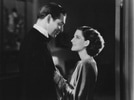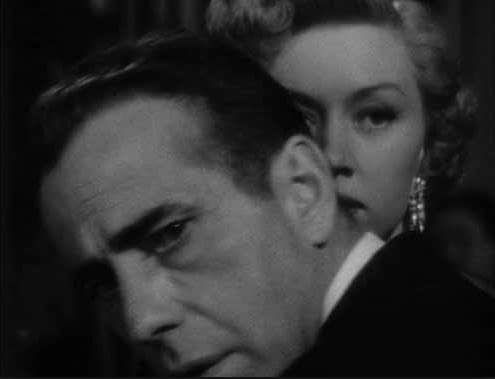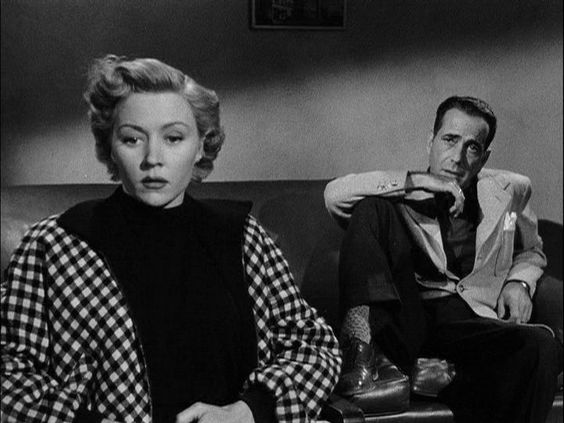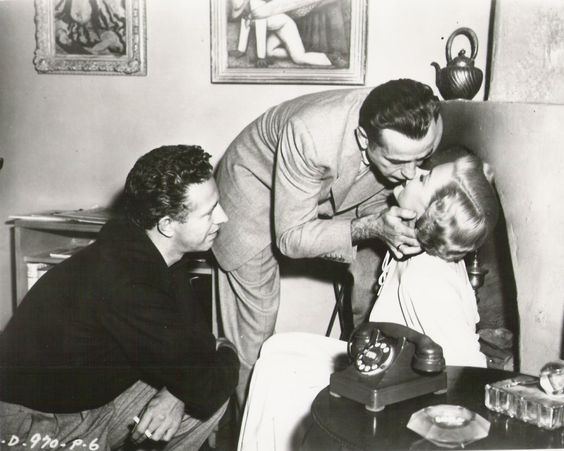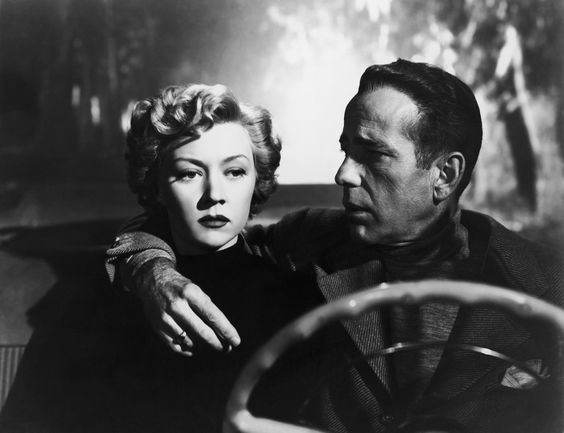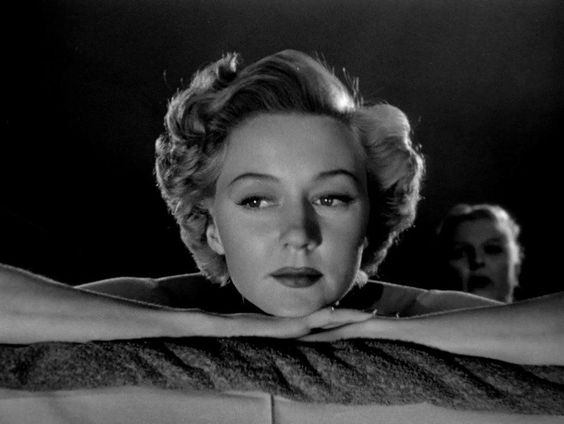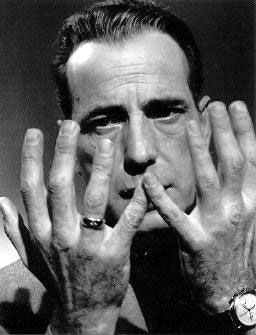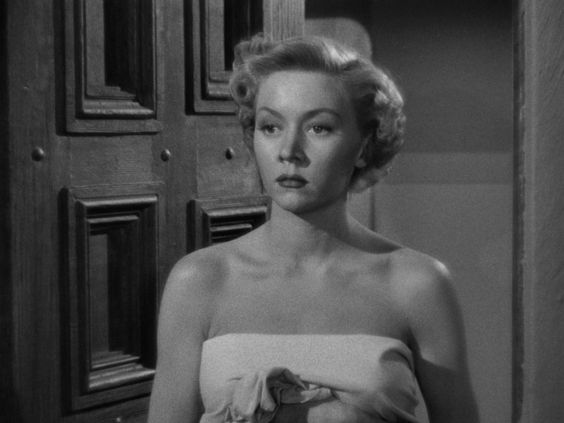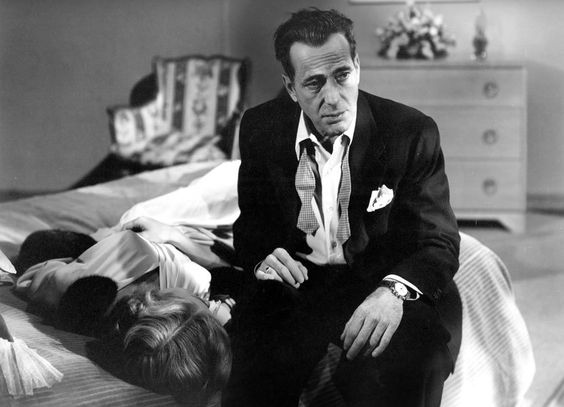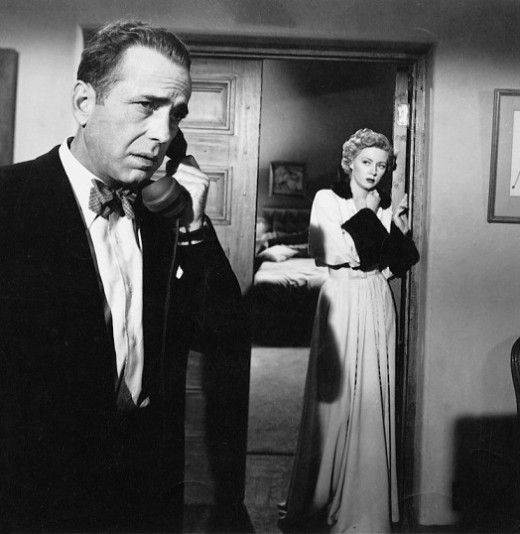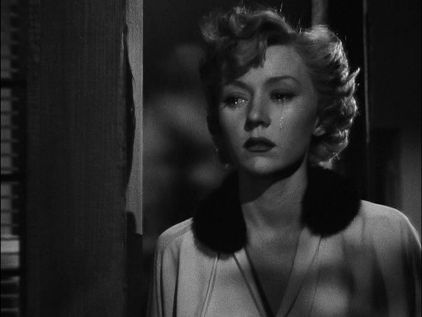Thoughts:
Dix Steele is selfish bully with a reputation for violent outbursts. He’s also a drunk and an egoist who feels sorry for himself and a generally miserable person who might just be a murderer. The fact that Humphrey Bogart plays Dix Steele in Nicholas Ray’s In a Lonely Place makes the character the most complex & rewarding in Bogart’s illustrious career. Dix is a washed up screenwriter who takes a hatcheck girl home, under the guise of summarizing a trashy novel, who then becomes the prime murder suspect when she turns up dead the following morning. That there is doubt as to his innocence beguiles his agent, the investigating detective(Lovejoy), who just happens to be an old army buddy, and most importantly his neighbor/girlfriend who is the only one who can provide an alibi for him.
The complexity of Dix is many layered and at times plays on the Bogart mystique of cool indifference, but here from a position of potential guilt as opposed to superiority or righteousness as in Casablanca, Key Largo or The Maltese Falcon. Instead of easy identification with Bogart, the viewer is forced to look at Dix through a different lens; the lens of cruel indifference. His flashes of violence, first in a bar fight & later on the road while driving, reveal a temperamental and impulsive man, very capable of the murder he has been accused of & reveal Bogart at his best. In both instances of violence, there is a flicker in Dix’s eye just as he explodes, but it is the instant before Bogart winds like a spring, perfectly capturing the impulse that drives the rage.
Dix’s first appearance at police headquarters is a master class in the “Bogart mystique.” He is coolly confident, trading sarcastic remarks & general indifference with the police officers, feigning little interest in the murder or the girl. When Laurel Gray (Grahame) enters the captain’s office, however, the mood changes, gone with it the witty repartee and cynicism, replaced by a quiet calm. A clear sexual chemistry also takes over the room, Steele remembering looking at her in her nightgown the night before. Similarly, when Gray responds to the captain’s questions about her interest in Steele she looks directly at him, while saying “I noticed him because he’s interesting. I like his face” she is speaking to the viewer and for the viewer…Bogart 101.
Dix Steele is selfish bully with a reputation for violent outbursts. He’s also a drunk and an egoist who feels sorry for himself and a generally miserable person who might just be a murderer. The fact that Humphrey Bogart plays Dix Steele in Nicholas Ray’s In a Lonely Place makes the character the most complex & rewarding in Bogart’s illustrious career. Dix is a washed up screenwriter who takes a hatcheck girl home, under the guise of summarizing a trashy novel, who then becomes the prime murder suspect when she turns up dead the following morning. That there is doubt as to his innocence beguiles his agent, the investigating detective(Lovejoy), who just happens to be an old army buddy, and most importantly his neighbor/girlfriend who is the only one who can provide an alibi for him.
The complexity of Dix is many layered and at times plays on the Bogart mystique of cool indifference, but here from a position of potential guilt as opposed to superiority or righteousness as in Casablanca, Key Largo or The Maltese Falcon. Instead of easy identification with Bogart, the viewer is forced to look at Dix through a different lens; the lens of cruel indifference. His flashes of violence, first in a bar fight & later on the road while driving, reveal a temperamental and impulsive man, very capable of the murder he has been accused of & reveal Bogart at his best. In both instances of violence, there is a flicker in Dix’s eye just as he explodes, but it is the instant before Bogart winds like a spring, perfectly capturing the impulse that drives the rage.
Dix’s first appearance at police headquarters is a master class in the “Bogart mystique.” He is coolly confident, trading sarcastic remarks & general indifference with the police officers, feigning little interest in the murder or the girl. When Laurel Gray (Grahame) enters the captain’s office, however, the mood changes, gone with it the witty repartee and cynicism, replaced by a quiet calm. A clear sexual chemistry also takes over the room, Steele remembering looking at her in her nightgown the night before. Similarly, when Gray responds to the captain’s questions about her interest in Steele she looks directly at him, while saying “I noticed him because he’s interesting. I like his face” she is speaking to the viewer and for the viewer…Bogart 101.
The title, In a Lonely Place, signifies several elements in the story, particularly the loneliness of the creative mind, the separation of people in modern society, both physically & emotionally, as well the loneliness of Hollywood, with all its fakery & masquerading. Dix & Laurel’s relationship is a microcosm of this loneliness with the pressures of Dix’s guilt or innocence weighing on top of it all. In the end In a Lonely Place is really about love and trust, the police detective’s towards Dix, Dix’s toward Laurel and finally Laurel’s towards Dix. The pressures society ultimately places on relationships and the implications for that love & trust become the thrust of the story, with the actual solving of the murder more or less secondary to what people believe happened.
Ray & screenwriter Andrew Solt do a masterful job of periodically sewing doubt in Dix’s innocence, first by the recitation of Dix’s police blotter of violent acts by Captain Lochner, then through an incident of road rage with a college student, as well as repeatedly showing Dix on the verge of violent outbursts. The hurt behind Bogart’s eyes as remorse sets in after each event is palpable, but there is a steely exterior that even Laurel has a tough time piercing & ultimately it is that tough shell that undermines their relationship. Bogart plays every scene in a conflicted manner, with different degrees of anguish, hurt, despair and malice sprinkled in. It really is a joy to watch a screen idol offer such a nuanced portrayal of a complex character and In a Lonely Place shows Bogart at the peak of his skills as an actor.
While In a Lonely Place is arguably Bogart’s finest performance (he did win an Oscar for The African Queen), it also stands out as Gloria Grahame’s most complete performance. She, too, won an Oscar for another role (Best Supporting Actress for The Bad & the Beautiful), but Grahame never had the opportunity to create the depth of character that Laurel had in her many supporting roles. Her immediate flirting with Steele is tempered by her cool line “I always go home with the man who brought me” throws cold water on Dix’s offer of a ride home from the police station. Grahame amplifies her Noir personae in the casual way she rebuffs him, by revealing she’s no easy mark and that there’s depth behind her steely eyes and killer legs. As She & Dix play house while he writes the new screenplay there is a tranquil domesticity that belies Laurel’s eventual doubt of Dix’s innocence. Laurel attempts to will them to happiness, is punctuated by Grahame’s effervescent support, masking the growing concern and doubt she has towards Dix. Grahame is one of a handful of actresses, among them Bacall (To Have & Have Not), Hepburn (The African Queen) & Astor (The Maltese Falcon), who can go toe to toe with Bogart and come out unscathed; where the emotion between them, whether love, hate or a combination of the two, is equal and clearly reciprocal.
While their relationship may be equal, it is set against an overall condemnation of the Hollywood myth of the glory of fame and fortune. For Ray, Hollywood is a shallow pretext for civility, where only the rich & powerful are treated with respect and everyone else is, at best, cast aside & at worst, ridiculed and abused. Dix’s treatment of the former silent actor Charlie Waterman (Robert Warwick), for instance, is unique among the other Hollywood types and helps separate him from them. Dix is kind and benevolent towards Charlie, a washed up has-been, while his agent, producers & other actors pay Waterman no mind and mock him. Dix too is mocked by those above him in the current food chain, chastising him for his behavior and mocking his place beneath them. Dix’s agent, Mel Lippman (Art Smith) is caught between the rich & powerful and the down & out, yet his character reinforces the cynicism and callowness of Hollywood by making him sycophantic towards both sides. He berates & cajoles Dix, while praising the producers & directors he relies on for support for his clients. Arguably, Lippman however, could also be seen as the most sympathetic character in In a Lonely Place because he is eternally on the outside looking in, further reinforcing Hollywood’s negative depiction.
Ray & screenwriter Andrew Solt do a masterful job of periodically sewing doubt in Dix’s innocence, first by the recitation of Dix’s police blotter of violent acts by Captain Lochner, then through an incident of road rage with a college student, as well as repeatedly showing Dix on the verge of violent outbursts. The hurt behind Bogart’s eyes as remorse sets in after each event is palpable, but there is a steely exterior that even Laurel has a tough time piercing & ultimately it is that tough shell that undermines their relationship. Bogart plays every scene in a conflicted manner, with different degrees of anguish, hurt, despair and malice sprinkled in. It really is a joy to watch a screen idol offer such a nuanced portrayal of a complex character and In a Lonely Place shows Bogart at the peak of his skills as an actor.
While In a Lonely Place is arguably Bogart’s finest performance (he did win an Oscar for The African Queen), it also stands out as Gloria Grahame’s most complete performance. She, too, won an Oscar for another role (Best Supporting Actress for The Bad & the Beautiful), but Grahame never had the opportunity to create the depth of character that Laurel had in her many supporting roles. Her immediate flirting with Steele is tempered by her cool line “I always go home with the man who brought me” throws cold water on Dix’s offer of a ride home from the police station. Grahame amplifies her Noir personae in the casual way she rebuffs him, by revealing she’s no easy mark and that there’s depth behind her steely eyes and killer legs. As She & Dix play house while he writes the new screenplay there is a tranquil domesticity that belies Laurel’s eventual doubt of Dix’s innocence. Laurel attempts to will them to happiness, is punctuated by Grahame’s effervescent support, masking the growing concern and doubt she has towards Dix. Grahame is one of a handful of actresses, among them Bacall (To Have & Have Not), Hepburn (The African Queen) & Astor (The Maltese Falcon), who can go toe to toe with Bogart and come out unscathed; where the emotion between them, whether love, hate or a combination of the two, is equal and clearly reciprocal.
While their relationship may be equal, it is set against an overall condemnation of the Hollywood myth of the glory of fame and fortune. For Ray, Hollywood is a shallow pretext for civility, where only the rich & powerful are treated with respect and everyone else is, at best, cast aside & at worst, ridiculed and abused. Dix’s treatment of the former silent actor Charlie Waterman (Robert Warwick), for instance, is unique among the other Hollywood types and helps separate him from them. Dix is kind and benevolent towards Charlie, a washed up has-been, while his agent, producers & other actors pay Waterman no mind and mock him. Dix too is mocked by those above him in the current food chain, chastising him for his behavior and mocking his place beneath them. Dix’s agent, Mel Lippman (Art Smith) is caught between the rich & powerful and the down & out, yet his character reinforces the cynicism and callowness of Hollywood by making him sycophantic towards both sides. He berates & cajoles Dix, while praising the producers & directors he relies on for support for his clients. Arguably, Lippman however, could also be seen as the most sympathetic character in In a Lonely Place because he is eternally on the outside looking in, further reinforcing Hollywood’s negative depiction.
A final note of context for In a Lonely Place should focus on the prevailing mood in Hollywood and the country in general. With the Red scare a focus for the country as a whole & the HUAC investigation into Communist infiltration of Hollywood in particular, paranoia & distrust were inevitably a part of the film. Both Laurel & Dix were never quite able to say what was on their mind; they were never able discuss the weight of Dix’s guilt or innocence, a reflection of the suspicion felt by many. That a lover, a friend or an acquaintance could turn anyone in resulted in the stilted communication & fantasy world created by Laurel & Dix while working on the screenplay. Only as others infiltrated that world, the agent, the masseuse, the police, did that world crumble & their relationship with it. Ray’s repeated use of troubled outsiders in his films (Rebel without a Cause ‘55 & They Live By Night ‘48) works perfectly here with Dix & Laural. When they are isolated they are happiest and the oppressive nature of those around them and society as a whole undermines the tranquility of their relationship, just as doubt & suspicion weighed on society during the late ‘40’s and early ‘50’s.
In a Lonely Place’s conclusion is perhaps one of the saddest & most poignant in film history, but fits its Noir ethos to a tee. The final line, uttered by Laurel to police detective Nicolai (Frank Lovejoy), perfectly sums up the fatalistic conclusion and the film as a whole: “Yesterday that would have meant so much to us.” It’s as if looking backward were the only way to find happiness and the present and future can bring nothing but sadness and disappointment. Similarly, Dix’s line for his screenplay, “I was born when she kissed me. I died when she left me. I lived for a few weeks while she loved me” is the capstone that ties everything together and is one of the great film themes of all time.
In a Lonely Place’s conclusion is perhaps one of the saddest & most poignant in film history, but fits its Noir ethos to a tee. The final line, uttered by Laurel to police detective Nicolai (Frank Lovejoy), perfectly sums up the fatalistic conclusion and the film as a whole: “Yesterday that would have meant so much to us.” It’s as if looking backward were the only way to find happiness and the present and future can bring nothing but sadness and disappointment. Similarly, Dix’s line for his screenplay, “I was born when she kissed me. I died when she left me. I lived for a few weeks while she loved me” is the capstone that ties everything together and is one of the great film themes of all time.
Notes & Quotes:
*In the novel by Dorothy B. Hughes that is the basis for In a Lonely Place, Dix actually does commit several sex-based murders.
*Columbia Pictures executive Harry Cohn preferred Ginger Rogers for the part of Laurel. Ray insisted that Grahame was right for the part, but Cohn believed Ray wanted her only because he was his wife. Howard Hughes interjected and in several clandestine meetings with Cohn, including driving around all night in the Santa Monica alleys, they finally agreed to Grahame.
*In a Lonely Place is the favorite film of Abraham Polansky, the Academy Award nominated writer of Body & Soul (’47) & the writer/director of Force of Evil (’48) & Tell Them Willie Boy is Here (’69). Polansky was one of the Hollywood Ten who blackslisted as part of the House Un-American Activities Committee into communist infiltration of Hollywood in the late ‘40’s.
*Directors Samuel Fuller (Pickup on South Street ’53 & Shock Corridor ’63) & Anthony Mann (The Naked Spur ’53 & Raw Deal ’48) also cited In a Lonely Place as a personal favorite.
*TCM’s Noir Alley host Eddie Muller has named In a Lonely Place as his favorite Noir Film. “This incredible rethinking of Dorothy B. Hughes' disturbing serial killer novel is as close as a studio film ever got to "personal filmmaking." No noir iconography, just a profound darkness of the soul.” http://www.eddiemuller.com/top25noir.html
*Nicholas Ray went to the same high school in Wisconsin as director Joseph Losey (The Prowler ’51 & Concrete Jungle ’60), but they were 3 years apart. Losey refused to testify before HUAC and lived in self-exile in Great Britain.
*In the novel by Dorothy B. Hughes that is the basis for In a Lonely Place, Dix actually does commit several sex-based murders.
*Columbia Pictures executive Harry Cohn preferred Ginger Rogers for the part of Laurel. Ray insisted that Grahame was right for the part, but Cohn believed Ray wanted her only because he was his wife. Howard Hughes interjected and in several clandestine meetings with Cohn, including driving around all night in the Santa Monica alleys, they finally agreed to Grahame.
*In a Lonely Place is the favorite film of Abraham Polansky, the Academy Award nominated writer of Body & Soul (’47) & the writer/director of Force of Evil (’48) & Tell Them Willie Boy is Here (’69). Polansky was one of the Hollywood Ten who blackslisted as part of the House Un-American Activities Committee into communist infiltration of Hollywood in the late ‘40’s.
*Directors Samuel Fuller (Pickup on South Street ’53 & Shock Corridor ’63) & Anthony Mann (The Naked Spur ’53 & Raw Deal ’48) also cited In a Lonely Place as a personal favorite.
*TCM’s Noir Alley host Eddie Muller has named In a Lonely Place as his favorite Noir Film. “This incredible rethinking of Dorothy B. Hughes' disturbing serial killer novel is as close as a studio film ever got to "personal filmmaking." No noir iconography, just a profound darkness of the soul.” http://www.eddiemuller.com/top25noir.html
*Nicholas Ray went to the same high school in Wisconsin as director Joseph Losey (The Prowler ’51 & Concrete Jungle ’60), but they were 3 years apart. Losey refused to testify before HUAC and lived in self-exile in Great Britain.
